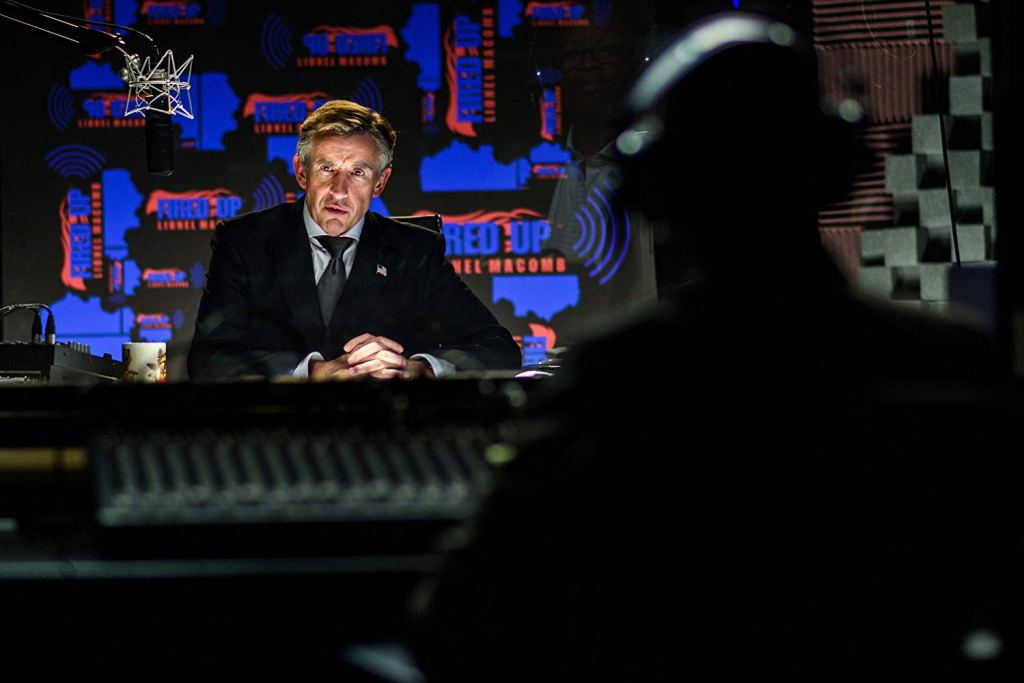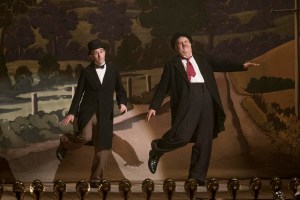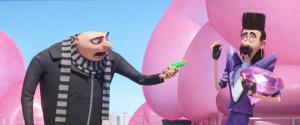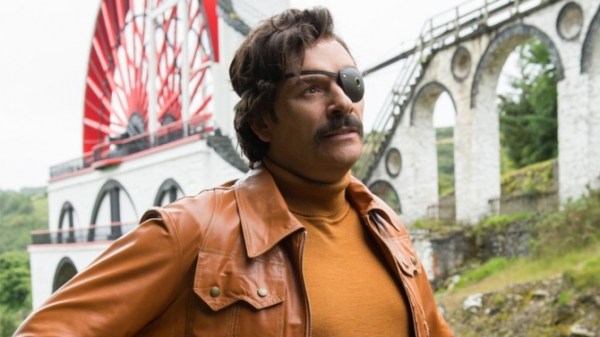This is their fourth trip actually; it was Spain before this, and Italy before that, and just a plain old Trip way back in 2010, during which Steve Coogan toured Britain’s best restaurants with best friend (and prime needler) Rob Brydon in tow. These two squabble like an old married couple but they also egg each other on to the greatest heights of comedy, throwing rockets of caustic remarks back and forth, stinging each other with brilliant insults, one-upping each other with first rate impressions.

Since 2010’s The Trip, the subsequent trips have largely followed the restaurant template, but for no good reason. The first one’s aim may have been to savour and review, but what followed was really just an excuse to throw together the same basic ingredients hoping to recapture their recipe for success. And the thing is, with very little effort, they do manage to replicate success. The films may defy traditional categorization but the Brydon-Coogan team is a winning bet, with the added bonus that Coogan continues to churn out content you’re likely familiar with, and Brydon continues to churn out new and exciting to lambaste it. Brydon gleefully pokes at Coogan’s apparent inability to recall an extra from his movie Greed. And he mocks Coogan’s BAFTA nomination for his work in Stan & Ollie – no, not his work, not his acting, his “copying,” his “impersonation,” two meaty jobs right to Coogan’s rib cage all while cajoling him into an impromptu Stan Laurel so that Brydon may offer his Hardy. Tom Hardy.
There’s something eminently watchable about these two. They hardly need the pretense of travel or fine dining; it is a pleasure to watch them under any circumstance. The Trip to Greece is available to rent via VOD, and each of the previous films is just as worthy.


 Greed’s comedic and satirical elements work well, with Coogan ably and expertly leading the way. I am sure Coogan could play this role in his sleep but he’s not phoning it in at any point. He clearly relishes the chance to play this type of character and he delivers a wonderfully over-the-top take on a selfish billionaire (though really, is there any other kind?).
Greed’s comedic and satirical elements work well, with Coogan ably and expertly leading the way. I am sure Coogan could play this role in his sleep but he’s not phoning it in at any point. He clearly relishes the chance to play this type of character and he delivers a wonderfully over-the-top take on a selfish billionaire (though really, is there any other kind?). to great lengths to honour his brilliant mind and the world’s most esteemed detective. Will Ferrell’s Sherlock is also supposed to be brilliant, but Cohen can’t find a way to express that while still being funny. The result is a rim shot – you know, when the basketball can’t decide whether to score or not, so it just sort of hobbles around in midair, keeping everyone in suspense? Only the movie’s tone is the basketball, and it circles the rim for so long that you’d rather just walk away in disgust than find it whether it eventually lands.
to great lengths to honour his brilliant mind and the world’s most esteemed detective. Will Ferrell’s Sherlock is also supposed to be brilliant, but Cohen can’t find a way to express that while still being funny. The result is a rim shot – you know, when the basketball can’t decide whether to score or not, so it just sort of hobbles around in midair, keeping everyone in suspense? Only the movie’s tone is the basketball, and it circles the rim for so long that you’d rather just walk away in disgust than find it whether it eventually lands. negotiate – or leave. He got himself a better deal elsewhere, but the problem was, Ollie didn’t walk with him. Too afraid to risk his small piece of the pie for the whole damn dessert, Hardy stayed behind, and even allowed himself to be reteamed with someone else. Ultimately their careers tanked and that was the end, or nearly the end, of Laurel & Hardy.
negotiate – or leave. He got himself a better deal elsewhere, but the problem was, Ollie didn’t walk with him. Too afraid to risk his small piece of the pie for the whole damn dessert, Hardy stayed behind, and even allowed himself to be reteamed with someone else. Ultimately their careers tanked and that was the end, or nearly the end, of Laurel & Hardy. she wants to know that he’ll be okay. But it’s creepy and invasive and neither Sam nor his prospective dates are super into this idea. Even Abbie’s support group is pretty skeptical. They’re also a pretty good source of humour in a movie that may have been overwhelmed by its maudlin theme. Thankfully the likes of Steve Coogan, Kate McKinnon, and Christopher Walken, all favourites of mine that I never dreamed would somehow end up sitting in the same little circle in the same film, go a long way to providing some comic relief.
she wants to know that he’ll be okay. But it’s creepy and invasive and neither Sam nor his prospective dates are super into this idea. Even Abbie’s support group is pretty skeptical. They’re also a pretty good source of humour in a movie that may have been overwhelmed by its maudlin theme. Thankfully the likes of Steve Coogan, Kate McKinnon, and Christopher Walken, all favourites of mine that I never dreamed would somehow end up sitting in the same little circle in the same film, go a long way to providing some comic relief. Stan (Richard Gere) is a politician poised to become an even more powerful politician, as evidenced by the aides who can’t quite allow him a moment of peace or privacy during the dinner (not that he objects); his wife, aka, his second wife, Katelyn (Rebecca Hall) raises his kids so that he can govern unencumbered and expects to be rewarded. Their sons have recently been involved in a crime that is making its way around Youtube. They are thus far unidentified but now the parents must decide how to handle things should they found out – or should they remain undiscovered.
Stan (Richard Gere) is a politician poised to become an even more powerful politician, as evidenced by the aides who can’t quite allow him a moment of peace or privacy during the dinner (not that he objects); his wife, aka, his second wife, Katelyn (Rebecca Hall) raises his kids so that he can govern unencumbered and expects to be rewarded. Their sons have recently been involved in a crime that is making its way around Youtube. They are thus far unidentified but now the parents must decide how to handle things should they found out – or should they remain undiscovered. Bratt is an entertaining character on paper: a washed up 80s TV child star who aged out and resented it until his old shows inspired him to become the very villain he played. Middle aged now, and armed with a mullet, a keytar, and a juicy 80s soundtrack that follows his every move, he pulls of heists with exploding bubble gum and an army of dolls who look just like him.
Bratt is an entertaining character on paper: a washed up 80s TV child star who aged out and resented it until his old shows inspired him to become the very villain he played. Middle aged now, and armed with a mullet, a keytar, and a juicy 80s soundtrack that follows his every move, he pulls of heists with exploding bubble gum and an army of dolls who look just like him. Canadians are consistently the funniest people in the world as far as I’m concerned, which is hard to reconcile with the stereotype that we’re boring and forgettable. So I don’t try, I just think of us as funny and the stereotype as another example of how Americans are just not as good as we are. Above all else, Canadians specialize in satire. I have to think that is inherited from our former colonizers, as the British may love satire more than we do.
Canadians are consistently the funniest people in the world as far as I’m concerned, which is hard to reconcile with the stereotype that we’re boring and forgettable. So I don’t try, I just think of us as funny and the stereotype as another example of how Americans are just not as good as we are. Above all else, Canadians specialize in satire. I have to think that is inherited from our former colonizers, as the British may love satire more than we do. earning a stipend in Los Angeles for several weeks. Her devout mother (Annette Bening) has already returned home in frustration, so now it’s just Marla and Frank (Alden Ehrenreich), her devoted, reliable driver, who hasn’t met Hughes yet either. His only job, besides driving her around, is not to fall in love with her. That’s kind of tricky even though he’s practically married and she’s a prim virgin. But when a man tells you your beauty and uniqueness means “rules don’t apply to you” – well, crap, it’s the kind of think that dampens the panties.
earning a stipend in Los Angeles for several weeks. Her devout mother (Annette Bening) has already returned home in frustration, so now it’s just Marla and Frank (Alden Ehrenreich), her devoted, reliable driver, who hasn’t met Hughes yet either. His only job, besides driving her around, is not to fall in love with her. That’s kind of tricky even though he’s practically married and she’s a prim virgin. But when a man tells you your beauty and uniqueness means “rules don’t apply to you” – well, crap, it’s the kind of think that dampens the panties. the public eye while skulking about in the dark. He doesn’t have as much use for these two young protagonists as they have for him, but it makes for an interesting dynamic.
the public eye while skulking about in the dark. He doesn’t have as much use for these two young protagonists as they have for him, but it makes for an interesting dynamic.